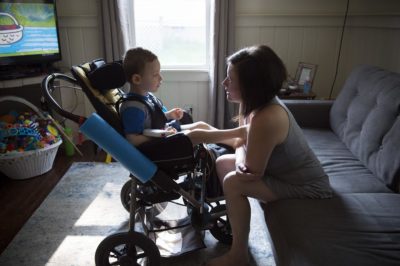Sarah Allen, a single mom, spends her days and nights caring for her son, Aidan.
Born premature with a malformed brain, Aidan, now 3, has multiple health conditions. They include cerebral palsy, epilepsy, obstructive sleep apnea and cortical visual impairment. He also has enlarged ventricles, scarring on his brain, and a mild form of microcephaly.
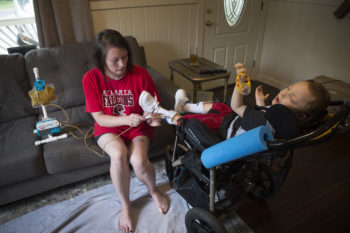
Aidan is fed through a tube 22 hours a day. He can’t sit up by himself, and gets around with help from a wheelchair. He does not speak.
He has been hospitalized 18 times, usually for seizures, infections or respiratory distress, Allen says.
Her son is covered by Medicaid. Though the program has covered the frequent hospital and doctor visits, Allen is fighting Medicaid over the number of hours that it will pay to cover a nurse’s visits to the home to help with caregiving.
But Allen, 31, has other worries. She’s facing the prospect of being homeless this fall. And not for the first time.
Allen’s situation is not much different from that of other families with medically fragile children. But her being a single mother adds to the financial and caregiving challenges, patient advocates say.
Finding employment is very difficult for a single parent whose child has what’s known as “medical complexity,” because the frequent medical visits make it hard for the parent to hold down a job, says Joe Sarra of the Georgia Advocacy Office, the protection and advocacy organization for people with disabilities in the state.

There’s a high rate of poverty in single-parent households like Sarah Allen’s, Sarra adds. Even in a family with two parents present, “one of them has to drop out of the workforce to meet the child’s medical needs,” Sarra says.
Currently Sarah Allen and Aidan live in a small Marietta house owned by a man who has allowed them to stay there for months. But Allen says the man has to put the house up for sale in October. If it’s sold, and she can find no other living arrangements, she and Aidan will become homeless for the third time. They haven’t been on the street, but they had to live in a hotel for a while.
Allen, as a constant caregiver, can’t leave Aidan’s side to work at a job. They live primarily on Aidan’s Social Security income of $711 a month.
Little money, few options
Allen, who gets food stamps, says she has received $180 a month in child support from her former husband, who is not involved in his son’s life. A court recently raised that amount, but, including SSI, she and the boy now are living on less than $1,000 a month, she says.
While in the womb, Aidan suffered a congenital cytomegalovirus (CMV) infection, which Allen says led to his medical problems.
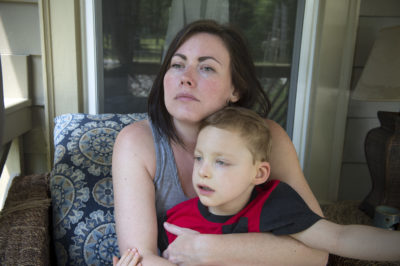
Currently he is receiving 28 hours of nursing care in the home each week, paid for by Medicaid. The state, through an intermediary organization, sought to reduce that number to eight hours. A physician, though, recently prescribed the addition of hours to what Aidan is getting now.
A hearing at an administrative court on Aidan’s nursing hours is scheduled for later this month.
Allen herself has been diagnosed with postural orthostatic tachycardia syndrome, a condition in which the heart rate goes up considerably higher when a person stands. Her heart rate often increases by 30 to 50 beats per minute or more. This can lead to lightheadedness, dizziness and fainting.
And Aidan is nearing a weight of 40 pounds, which nurses consider too much to lift without help, Allen says.
Her family life has been difficult at best, and her father recently died.
A church provided temporary housing for six months, ending one homeless stretch in a hotel.
Sarra of the Georgia Advocacy Office points out that children under age 21 who are Medicaid-eligible have the right to guaranteed medically necessary services through the Medicaid Act’s Early and Periodic Screening, Diagnosis and Treatment (EPSDT). EPSDT ensures children this right by providing access to medically necessary and long-term services that allow the child to remain in a permanent home and avoid placement in an institutional setting.
The Georgia Department of Community Health conducts periodic reviews of hours provided and regularly decreases hours of skilled nursing contrary to doctors’ prescriptions, Sarra says.
Families have the right to appeal such reductions of services, but given their financial circumstances they can rarely get lawyers, and the appeals are often unsuccessful, he says.
Joe Sarra fears that in the worst-case scenario, Aidan could end up as a ward of the state.
Children with medical complexity are one of the smallest but fastest-growing populations of children, experts say.
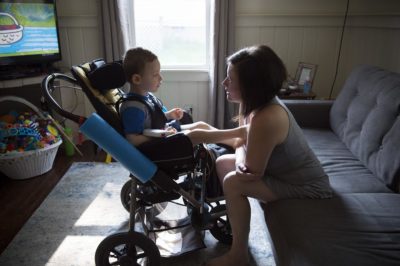
There are an estimated 400,000 such children in the nation, but they account for as much as one-third of health care spending for all children, according to an issue brief from the Lucile Packard Foundation for Children’s Health.
Their rates of emergency room use are high, their hospitalizations are long, and their hospital readmissions are frequent, wrote the report’s author, Dr. Jay Berry, a pediatrician who specializes in the care of children with medical complexity at Boston Children’s Hospital.
“Caregiving for CMC [children with medical complexity] can be a very rewarding, yet herculean, strenuous, stressful, and time-consuming task,’’ Berry wrote. Their medical complexity makes it difficult to meet their health care needs, and so of all children, “they are the most likely to have unmet health care needs.”
“Unfortunately, families’ efforts, out-of-pocket expenses, and missed days of work providing extensive home care can become both a financial and emotional burden,’’ Berry said in the report. “It’s not uncommon for a child to have as many as 25 ongoing health care needs that are met among 10 or more different pediatric providers.’’
The state agency that runs the Medicaid program, asked about nursing hours and Aidan’s situation, said in a statement that the Georgia Pediatric Program (GAPP) consists of in-home skilled nursing with personal supports. It serves children who are medically fragile.
Families seeking skilled nursing services are authorized nursing hours “based on documented medical necessity,’’ said Lisa Marie Shekell, a deputy commissioner for the Department of Community Health, in the statement.
The struggle continues
Nancy Caulfield, who runs Champions for Children’s Healthcare, says she has noticed a reduction of in-home nursing hours for medically complex children.
Caulfield is a nurse who has worked with medically fragile children. She helped manage several medical day care facilities for these kids in Georgia and elsewhere, run by nurses.
These centers closed down in Georgia, Caulfield says, because of numerous denials of Medicaid coverage. “The centers couldn’t sustain themselves.”
In 2011, 553 medically fragile children were cared for by 11 of these day cares throughout Georgia. By mid-2015, there were only 70 children receiving these services, Caulfield says.
“It was horrible to see these centers go away,’’ Caulfield says. About 20 states have medical day care, she adds, “It’s thriving in Florida.”
The centers allow many parents to work, and bring more of a normal life to the family, Caulfield says.
Shekell, the Community Health official, said in her statement that a 2012 review by the federal Centers for Medicare and Medicaid Services said the Georgia Pediatric Program had not fully applied the medical necessity criteria as required by the federal government.
“Since the 2012 finding, the Department of Community Health has and will continue to apply the appropriate medical necessity criteria to guarantee that children served by Georgia Medicaid have access to the vital services for which they need and qualify for both programs.’’
Caulfield says Aidan is clearly a medically fragile child. “Sarah’s situation is not unusual. What’s unusual is that she’s by herself.”
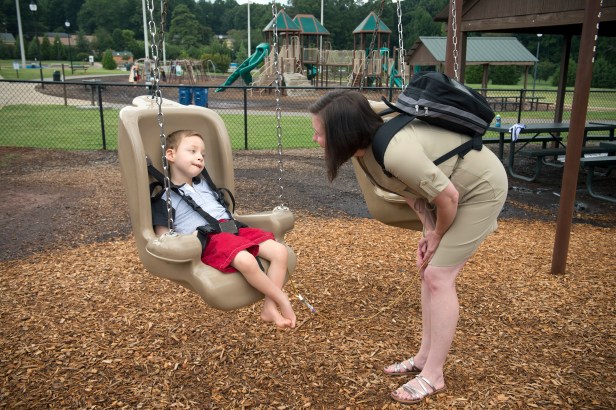
Allen has reached out for help in housing, including Section 8, but has run into waiting lists. “Homeless shelters don’t accept medically fragile children,’’ she adds. She says she has run out of housing options.
“I have been told many times that I need to consider placing my son in foster care, in an institution, or place him for adoption. After fighting so hard, alone, to keep him alive, that is more than heartbreaking to hear.”
“I don’t want the pity thing,” Allen says.
She’s determined she won’t give up on his care or on obtaining a home. She’s continuing to fight. “I hope we can help other kids in this situation.”
Aidan’s Facebook page is Facebook.com/MyCMVFighter
People seeking to correspond with Sarah Allen can write to her at this address:
2550 Sandy Plains Rd.
Suite 225
#370
Marietta, GA 30066

